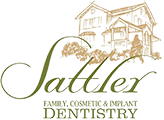Call: 215-357-0476 | SattlerDMD@comcast.net
635 Street Rd Southampton, PA 18966
Snoring and Other Sleep Disorders
Snoring Can Be a Serious Problem
Snoring is the sound made when the tissues of the soft palate, tongue and throat partially block the airway and vibrate against the back of the throat during sleep. While snoring can be harmless, it can turn into a difficult situation if the individual has a sleeping partner, or lives in close quarters where others are trying to sleep nearby. An online survey, conducted by the Sleep Council of England in March, 2008 found that one in four people who are married or share a bedroom regularly retreats to a spare room or sofa to escape a snoring partner and get a good night’s sleep.
Of greater concern is the fact that snoring can also be the sign of a serious medical condition known as Obstructive Sleep Apnea (OSA).
What is Obstructive Sleep Apnea?
Obstructive Sleep Apnea occurs during sleep when the tongue and soft palate relax to the point that they block the flow of air. Without air, the oxygen level in the body drops. This causes the brain to come out of a deep sleep, partially awakening the individual. The airway then opens, clearing the obstruction in the throat—usually with a loud gasp. Breathing then returns to a normal state as you move back into a deep sleep. As you reach deep sleep once more, the airway muscles collapse again, breathing can stop for 10 seconds or more, and you awaken again with a gasp. This cycle can occur many times during the night and as high as 700 per night in severe cases.
It is estimated that 20 million Americans (nearly one out of every 8 individuals) have some degree of Obstructive Sleep Apnea (OSA). Obstructive Sleep Apnea and other sleep-related disorders can lead to hypertension, heart attack, stroke, depression, muscle pain, excessive daytime sleepiness and other destructive and dangerous problems. Case in point: the National Highway Traffic Safety Administration (NHTSA) estimates conservatively that each year drowsy driving is responsible for at least 100,000 automobile crashes, 71,000 injuries, and 1,550 fatalities.
How Do I know I have Sleep Apnea or Another Sleep Disorder?
If you exhibit three or more of following symptoms, you may have sleep apnea or another sleep-related disorder and should be properly diagnosed by a trained medical/sleep specialist:
- Daytime Sleepiness (click here for a self-administered test)
- 17” neck size for men; 15½” neck size for women
- Poor concentration or memory; trouble learning
- Irritability
- A loss of interest in sex
- High blood pressure
- Waking up with heartburn or acid reflux
- Accident-prone
- Falling asleep at inappropriate times, i.e., work, on the phone or while driving
- Clenching or grinding of the teeth
- Patterns of snoring interrupted by pauses, then gasps
- Depression
- Waking with a headache
- Waking with a sore or dry throat
- High cholesterol
If you have symptoms of sleep apnea, Dr. Sattler will work in conjunction with a certified sleep physician (i.e., an Ear/Nose/Throat Specialist, Pulmonologist, or Certified Sleep Center) to obtain a proper diagnosis (assuming you haven’t already been diagnosed). These medical professionals are trained to evaluate your possible sleeping disorder and/or conduct a scientific sleep study (polysomnogram or PSG) which will determine the exact nature of your condition.
Once a diagnosis is made, Dr. Sattler will be able to determine if you can be treated with an oral appliance to alleviate your symptoms and work as a part of the medical team in your diagnosis, treatment and ongoing care.
Schedule your consultation
Contact us about dental treatment. Schedule your initial examination to discuss your tooth loss and how implants can restore your tooth function and your appearance.
Hours of Operations
Monday: 8:00AM – 5:00PM
Tuesday: 8:00AM – 5:00PM
Wednesday: 8:00AM – 5:00PM
Thursday: 8:00AM – 5:00PM
Friday: Closed
Saturday: Closed
Sunday: Closed


